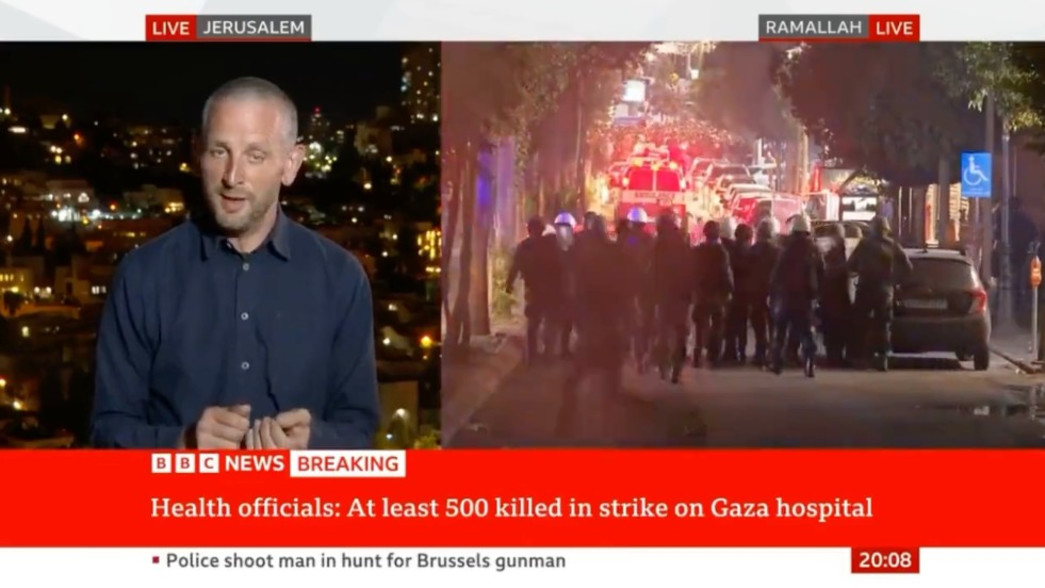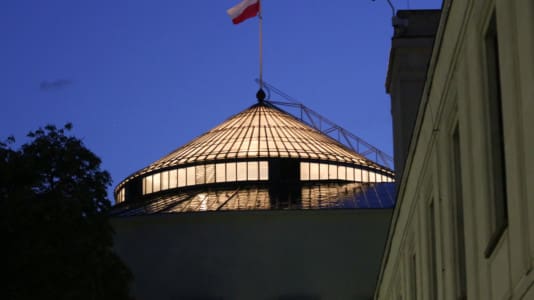The BBC has come under fire for jumping the gun on Tuesday’s explosion at a hospital in the Gaza Strip and has been accused of doing British Jews a huge disservice by initially reporting the blast as an Israeli air strike, a claim vehemently rejected by the Israeli government.
Lawmakers of the governing Conservative party slammed the public broadcaster’s coverage of the incident on Wednesday, accusing the Beeb of fuelling the anti-Jewish sentiment perpetuated by some across the country.
“Reporting of the tragic explosion at the Al-Ahli hospital by the BBC and others was like a 21st-century blood libel,” claimed government minister Robert Jenrick.
“Jewish people at home and in Israel will suffer as a result of their carelessness, ignorance, and irresponsibility,” he added.
[pp id=96130]
Conservative MP Stephen Crabb lambasted the BBC’s initial reporting of the explosion in a question put to Prime Minister Rishi Sunak in the House of Commons on Wednesday.
“Sections of the British media were reporting as fact that it was Israeli rockets that had landed and attacked the Al-Ahli hospital, relying on information supplied by officials in terrorist-controlled Gaza. The headlines have since been rewritten, but the outpouring of Jew hate on social media overnight was vile,” he said.
“The way that this conflict has massive implications for our Jewish community and any information coming from Hamas must be treated with a degree of scrutiny and cross-examination that is sadly sometimes lacking,” Crabb added.
Info supplied by 'officials' in terrorist-controlled Gaza needs to be treated with much greater scrutiny and cross-examination by media. The rush to apportion blame last night for the Al-Ahli atrocity led to an outpouring of Jew hate. My question to the Prime Minister today. pic.twitter.com/Q4DvBAlQ4o
— Stephen Crabb (@SCrabbPembs) October 18, 2023The U.K. prime minister agreed that media outlets “should not rush to judgment” before receiving all the facts, “particularly given the impact on communities here and across the region.”
“It is incumbent on all those in positions of responsibility to recognize that the words we say will have an impact and we should be careful with them,” he added.
In the immediacy following the blast, BBC correspondent Jon Donnison who was reporting on the ground from Jerusalem, claimed that it was “hard to see” how the explosion was caused by anything other than an Israeli air strike.
“The Israeli military has been contacted for comment and they say they are investigating,” he told viewers.
“But it is hard to see what else this could be really, given the size of the explosion, other than an Israeli air strike or several air strikes because when we’ve seen rockets being fired out of Gaza, we’ve never seen explosions of that scale.
“We might see half a dozen, maybe a few more, people being killed in such rocket attacks but we’ve never seen anything on the scale of the sort of explosion on the video I was watching earlier, which as you say is still to be verified,” he added.
BBC World News reported on Tuesday evening that “hundreds of people have been killed in an Israeli strike on a hospital in Gaza,” caveating the statement with, “according to Palestinian officials.”
A social media post reporting this news was reposted by Shayan Sararizadeh, a journalist at BBC Verify, a team of investigative journalists that the BBC itself said was formed to “address the growing threat of disinformation and build trust with audiences by transparently showing how BBC journalists know the information they are reporting.”
Latest images from the BBC Verify office. pic.twitter.com/dqhjlF9e54
— Summerisle (@LairdSummerisle) October 18, 2023In its initial social media posts reporting the hospital explosion, the BBC did not tell its readers that Hamas’ blaming of Israel had not been verified. However, when the Israel Defense Forces (IDF) denied responsibility for the blast on Wednesday, the broadcaster stated that it had not been able to verify Israel’s claims.
This led to the IDF accusing the broadcaster of choosing “to believe a genocidal terrorist organization” and questioning its impartiality and independence.
The BBC claims to be impartial and independent…
But we were unable to verify those claims.
Instead they choose to believe a genocidal terrorist organization ⬇️ pic.twitter.com/Hi8jc4cLiy
— Israel Defense Forces (@IDF) October 18, 2023Former Conservative Culture Secretary Nadine Dorries, who resigned as an MP earlier this year, labeled BBC correspondent Jon Donnison a “propagandist,” while several other prominent journalists slammed the BBC for jumping the gun.
“The BBC, Sky, etc push a false story about Israel bombing a Gaza hospital (It was a Palestinian-fired rocket), and this, in turn, pushes genocidists-in-waiting to process to their next stage. Nice teamwork, guys,” remarked Spectator columnist Douglas Murray.
“Hello BBC, Israel did it. We’ll provide evidence later, trust me bro.” pic.twitter.com/Y1Njk6Vd0U
— Chris Rose (@ArchRose90) October 18, 2023The Mail on Sunday columnist Dan Hodges claimed the BBC could “no longer be viewed as a credible, impartial source on the Gaza conflict,” accusing the broadcaster of reporting Hamas’ claims “uncritically.”
The BBC has become embroiled in several scandals in the aftermath of the recent escalation of tensions in the Middle East after refusing to call Hamas a “terrorist organization,” despite the group being labeled a “proscribed terrorist organization” by the U.K. government and across the European Union and the United States.
The broadcaster was forced to suspend several of its journalists earlier this week who had been accused of endorsing the Hamas terror attack on Israel on Oct. 7, which killed more than 1,300 civilians.
Some journalists described the attack as a “morning of hope” and referred to Israelis as “Zionist thieves and usurpers.”
It still remains an open question whether Israel or Palestine was responsible for the attack on the hospital.






